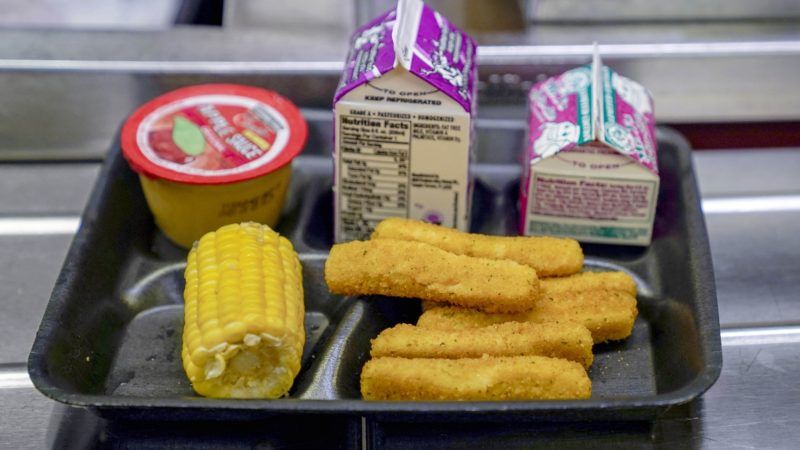USDA's Rollback of School Lunch Reforms Won't Accomplish Anything
This is just the latest petty development in what is an ugly, mostly partisan dance.

Last week the USDA announced plans to further loosen school-lunch reforms implemented under the Obama administration. The Trump administration announced the proposed changes to rules adopted under the Healthy, Hunger-Free Kids Act, which were championed by then-First Lady Michelle Obama, on the former First Lady's birthday.
This is just the latest petty development in what is an ugly, mostly partisan dance. (Though Snopes claims the HHFKA "receiv[ed] bipartisan support in [C]ongress," the yeas included all but eight out of 255 Democrats but only 17 of 179 GOP lawmakers.)
"The Obama administration's changes to the National School Lunch Program, championed by then-First Lady Michelle Obama and adopted in 2012, modified requirements for sodium, whole grain, milk, and fruits and vegetables served as part of the school lunch program," I wrote last year. "In 2018, the Trump administration rolled back many of those changes."
(A multi-state lawsuit challenging the Trump administration's actions, which I discussed after it was filed last year, hasn't been resolved.)
The newly proposed rule changes, which appeared in the Federal Register this week, show the USDA wants to loosen existing rules for including vegetables in school lunches and permit more a la carte items such as hamburgers to appear more frequently on menus. Among other changes, the proposal would "allow schools to reduce the amount of vegetables and fruits required at lunch and breakfast."
The USDA couched the changes as "optional flexibilities" intended to streamline foodservice, eliminate some administration burdens, and reduce food waste. A new USDA fact sheet argues the proposed rules, which you can comment on right here if so inclined, would "better enable schools to serve nutritious foods children will be eager to eat while also increasing program efficiency and integrity."
Is that so bad? A study commissioned by the USDA last year found kids throw away around one-quarter of the fruits, fruit juices, milk, and bread schools serve them, and bin nearly one-third of vegetables. The study also found that kids are least likely to discard meats or meat substitutes (14 percent). More of the latter and less of the former, the thinking goes, would both improve student nutrition and reduce food waste.
But many critics aren't buying what the USDA is selling.
A commentator with the Center for Science in the Public Interest claims the Trump administration is "sabotaging" and "basically aiming a flamethrower at" one of the Obama administration's signature laws.
The San Antonio Express-News editorial board called the proposal "as unpalatable as a soggy French fry."
(That French fry quip is a nod to the fact many see the powerful potato lobby's fingerprints all over some of the Trump administration's reforms. Notably, the same lobby also attempted to strangle some Obama administration school-lunch rules.)
"This is all about pizza sales and other ways of boosting districts' a la carte revenue," wrote Bettina Elias Siegel, a leading advocate for the Obama administration's school-lunch policies.
Some critics mocked a change that would count pasta made from vegetables as a vegetable, while others kept their comments to a tweet's length.
Critics of the USDA proposal are as plentiful as food waste in a school lunchroom. Vocal supporters are tough to locate.
In a statement this week, the School Nutrition Association, which represents the interests of tens of thousands of the nation's school lunchroom workers—lunch men and ladies—withheld judgment on the changes while noting what it sees as several benefits the changes would provide, including the option to serve students more lean protein (such as eggs) and less grain at breakfast time.
In touting those benefits, the group's stance is consistent with previous statements on the benefits of rolling back the Obama administration's regulations. Indeed, the SNA's statement reiterates the group's belief in "the need to streamline overly complex child nutrition programs and cites how current school meal flexibilities have helped ease school menu planning challenges while maintaining strong nutrition standards to benefit students."
Supporters toe the Trump line. Critics toe the Obama line. All that toeing stinks.
Ultimately, politics should have nothing to do with the foods kids eat at school. Critics of the Obama administration's school-lunch reforms, me included, argued the changes meant both soaring costs and mountains of food waste. Critics of the Trump administration's school-lunch reforms, me included, argue the changes mean school lunches stink like they used to and offer students lower-quality food. On school lunches, both administrations created new problems instead of offering a solution.
So what can be done? As I've argued here and detail more fully in my 2016 book Biting the Hands that Feed Us: How Fewer, Smarter Laws Would Make Our Food System More Sustainable, getting the USDA and the federal government out of the school-lunch business entirely would let states, cities, local communities, and families work together to improve nutrition and cut food waste and costs. That's a workable plan—something the USDA's National School Lunch Program wasn't, isn't, and won't ever be.


Show Comments (148)